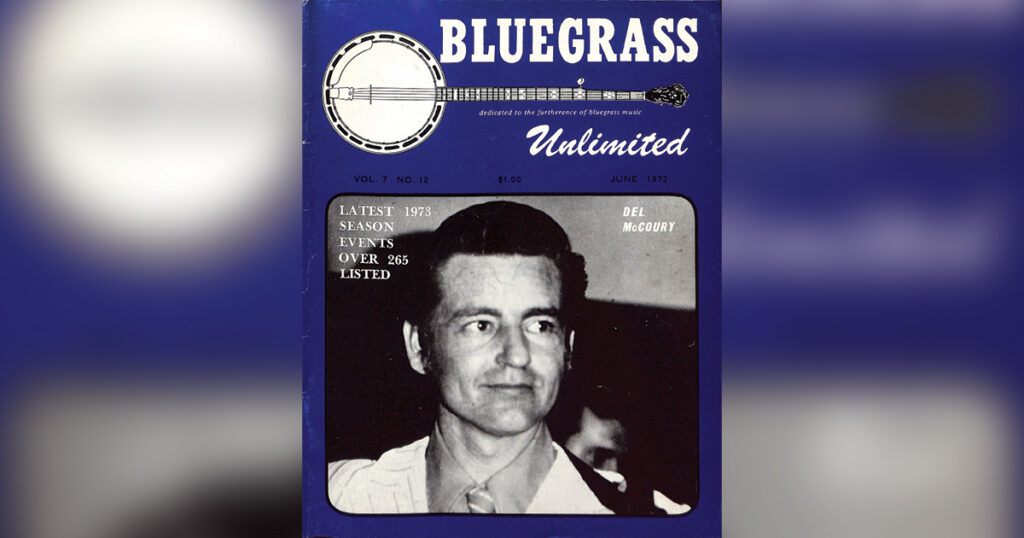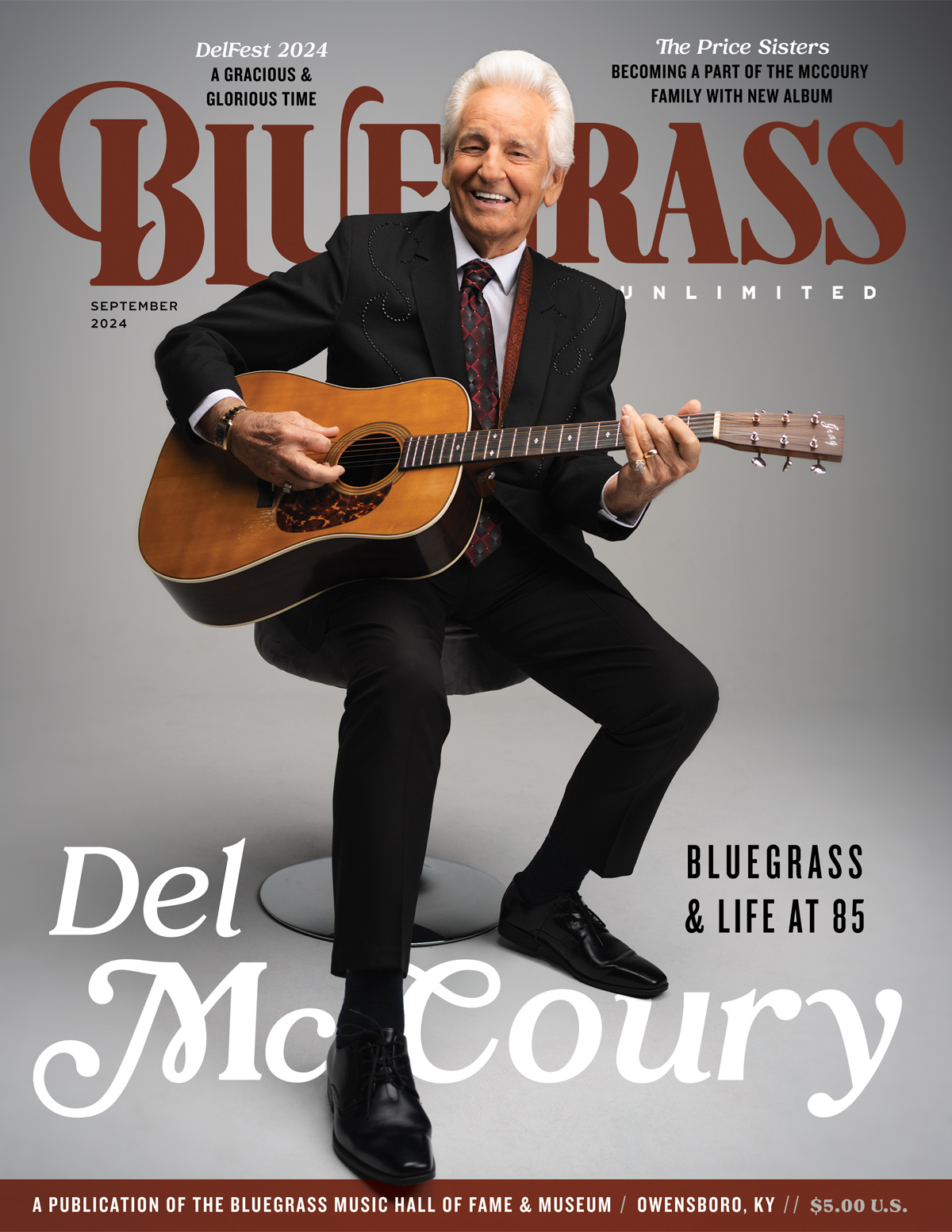Home > Articles > The Archives > Del McCoury
Del McCoury
From an interview with Ken Irwin August 1972
Reprinted from Bluegrass Unlimited Magazine
June 1973, Volume 7, Number 12
“Drive is the most important part of this music. When I look back, it is the drive in this music which excited me and that was the thing that I strived for.”
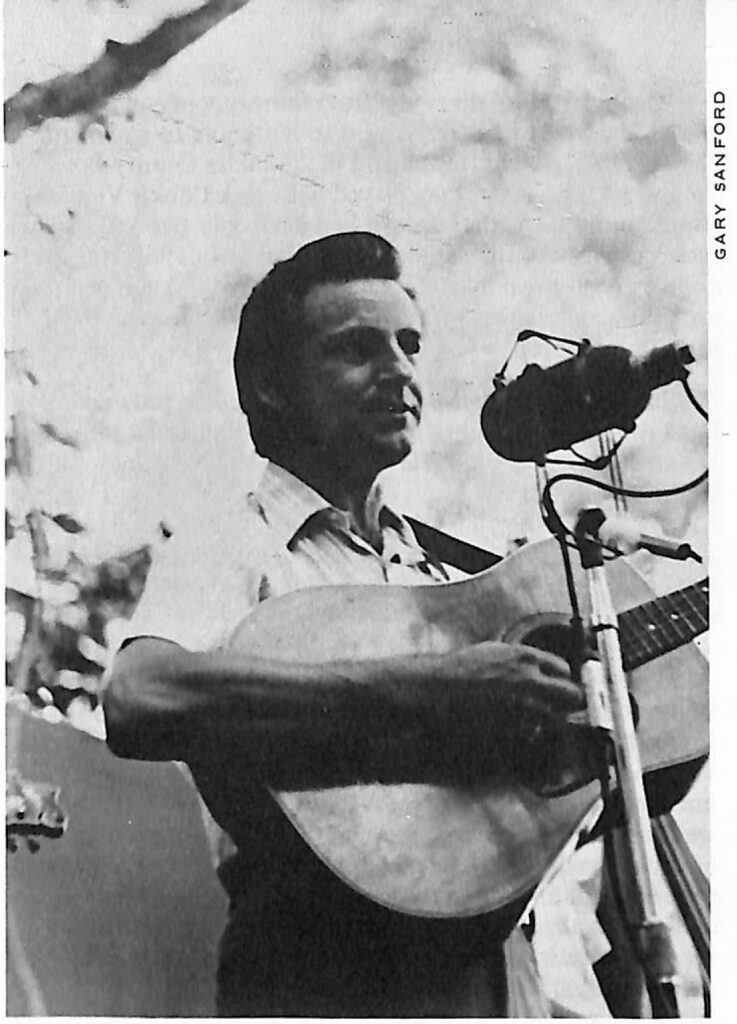
Thus, Del McCoury, a relatively young musician who has one of tire most old-timey traditional sounds, begins to describe the events and influences which resulted in his becoming one of the great bluegrass artists today. His high tenor, his selection of new song material, and the tight harmony of his Dixie Pals bring Del great respect from bluegrass fans.
The first influence on Del’s music came from his family: from his mother, Hazel McCoury, who sang and played organ, piano and harmonica; and from his older brother, G.C., who taught him to play the guitar and introduced him to the sounds of Earl Scruggs and Bill Monroe.
“It’s amazing my dad didn’t play anything. He really liked music, most of his people played, you know. My grandpa, he played organ and banjo. Probably my older brother G.C. and I got our music from our mother for she loved music. I heard a lot of music when I was a kid but I never really was enthused about it until I heard Earl Scruggs pick the banjo. My brother bought a 78 Flatt and Scruggs record of “Roll in My Sweet Baby’s Arms” and the other side was “I’ll Just Pretend.” I didn’t pay much attention to the singing at that time but I really liked that banjo and tire thing I liked best was the way Earl rolled it on his backup on “Roll in My Sweet Baby’s Arms.” I just about played that record until it wore through.
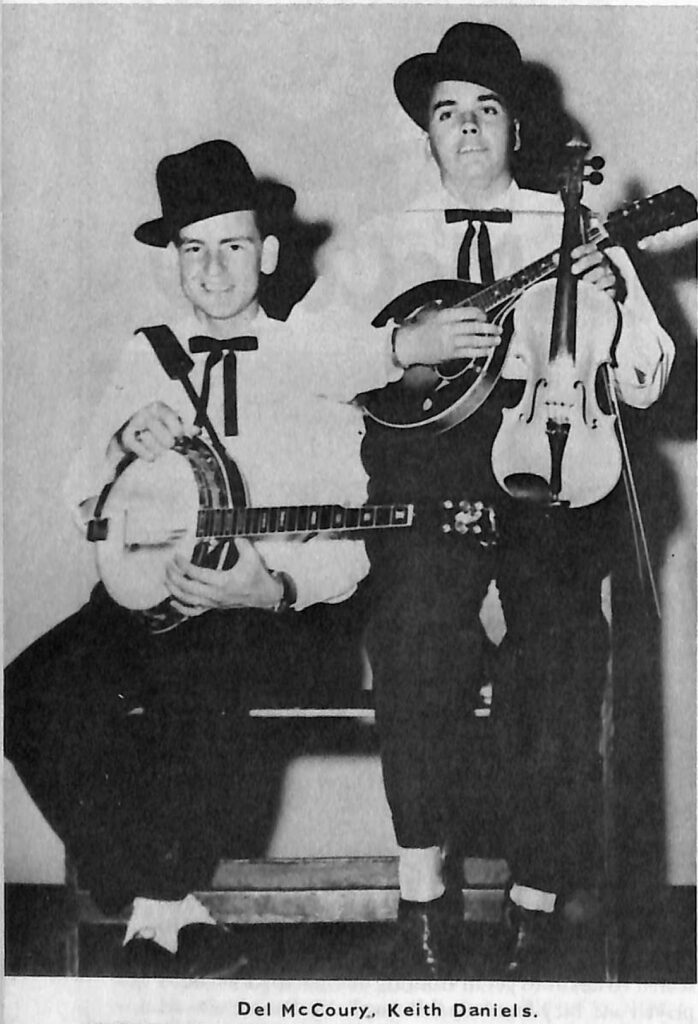
“I think at that time my brother liked the old country music more. He sang a lot of Ernest Tubb, and Roy Acuff. He’d make me stay up every Saturday night and listen to the Grand Ole Opry with him and I’d get sleepy ’cause I was just a kid and I’d get mad but he’d make me stay up with him. I liked Bill Monroe’s singing and really liked that banjo of Earl’s, so I started playing the banjo. At that time, 1953, you didn’t see anyone that even had one (a banjo) and nobody played one the way I liked to hear it played. My father borrowed a Vega banjo for me from a man he drove a truck for, and when I got out of high school the first thing I bought was a new Gibson banjo. Paid cash for it. I played that until 1957, I guess, and then I bought an old Gibson which I heard Walter Hensley playing down in Baltimore in a club. I still have that old banjo.”
Del got his first job, playing on a Chambersburg, Pa. radio station with the Stevens Brothers, through his acquaintance with Keith Daniels, a restaurant owner and fiddle player. It was Keith Daniels who convinced Del to audition: “The following Saturday, he (Keith) took me up there and I was scared to death to get in front of that microphone but I played and they hired me.” It was Keith Daniels also who, through his encouragement and help, pushed Del over the line from amateur to professional musician. “You know, I owe a lot to Keith cause he pushed me. I was too backward to really sing out or pick hard and put everything into it but he just kept on me all the time. He really knew how to get someone to put their best into it and he understood how the whole tiring should sound. And he could really sell a band. When I worked in his band, in this area, we were working more than even country bands.”
Del and Keith stayed with the Stevens Brothers almost a year, during which time they often played on Carlton Haney’s “New Dominion Barn Dance” in Richmond Va. Then Keith left to form his own band, the Blue Ridge Ramblers, and Del went with him. They had a lot of work at carnivals, parks, clubs, and dances. The Blue Ridge Ramblers recorded an album on the Empire label in early 1962, just before Del went into the Army. Without Del, Keith Daniels stopped playing professionally and returned to the restaurant business.
Del got a medical discharge from the Army in June, 1962, and he and his brother Jerry went to Baltimore to play guitar and bass with Melvin Howell and the Franklin County Boys for a short time. Then they played with Jack Cook’s Virginia Mountain Boys. At that time, it had been only two years since Jack had played with Bill Monroe, and in early 1963 Monroe came through town in need of a banjo player and guitar player for a show in New York City; Cook recommended Del to go with them.
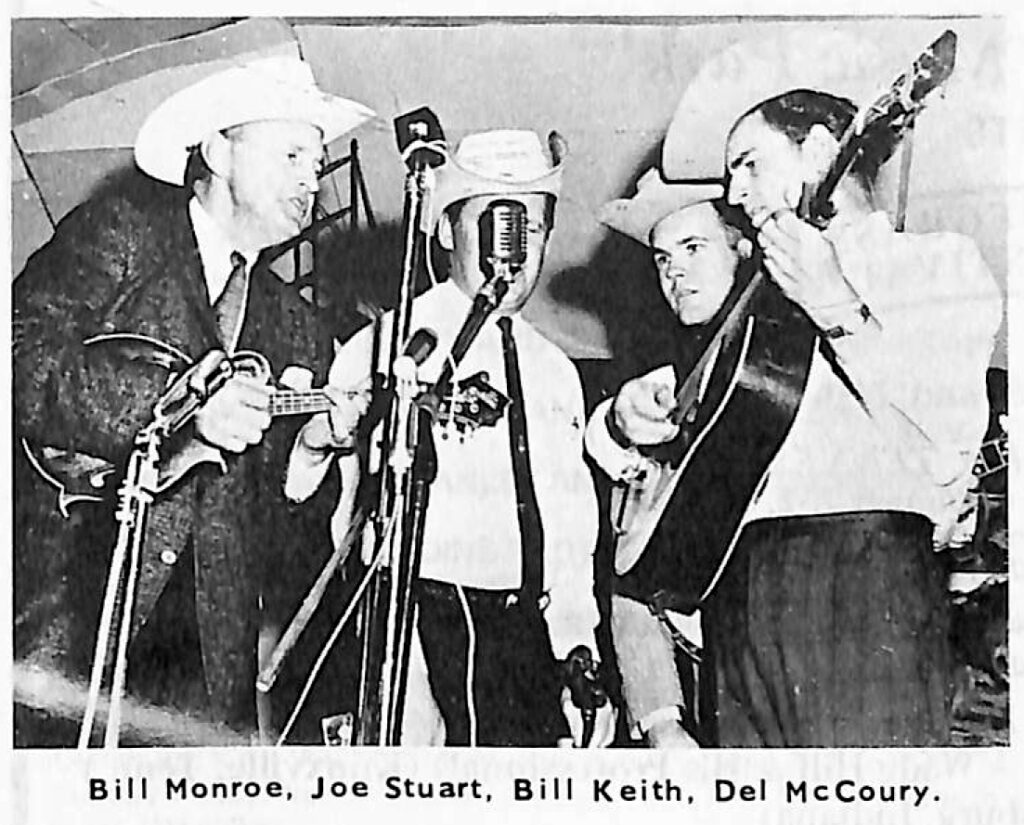
“I never met Bill before this. I’d seen him on shows a lot but I never spoke to him. From that show Bill asked me if I would like to have a job. He said, ‘If you ever quit Jack, come to Nashville and I will give you a job.’ I waited about a month but Jack wasn’t playing too much, so I made up my mind to go to Nashville. The day before I got there Bill had hired Bill Keith on the banjo, and he told me ‘did you ever sing and play tire guitar?’ ”
In February, 1963, Del joined the Blue Grass Boys as lead singer and guitar player. Working for Bill was a new experience for Del: “I worked hard, learned a lot of Bill’s songs I didn’t know before. That was a new experience for me, learning so many new songs at one time. A lot of times we’d get on stage and I’d get the verses mixed up, but it was really good for me because I really had to buckle down and work when I went with Bill. I didn’t have as much trouble singing with him as I did learning the songs.” Del stayed with the Blue Grass Boys for one year during which time he cut six sides with Bill; only two of these (“Roll On Buddy” and “I’m One of God’s Sheep”) have been released.
“In February one year later, I left Bill to go to California with Billy Baker (fiddle) and joined the Golden State Boys, whose manager promised me a pretty good living. But when we got out there, they didn’t have much work at all, so then Billy and I got a band up in Norwalk, Calif., the Shady Valley Boys. We played the bluegrass portion of a TV show every Sunday. We played clubs and the TV show but there wasn’t enough work out there for a bluegrass band. In June we came back here and I started working for my dad in the woods, logging. When you quit playing, you just can’t stay from it and I got a club here and a little date there and pretty soon I was back into it again.”
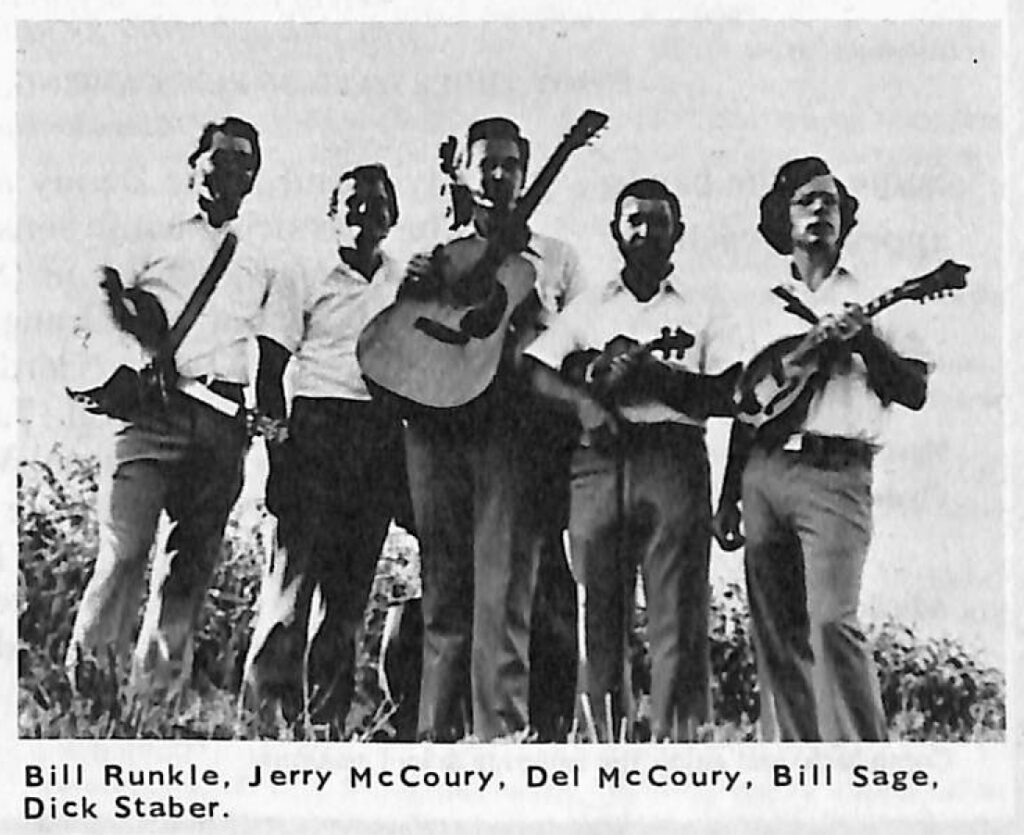
Then in the summer of 1969, Del organized the original Dixie Pals, consisting of Jerry McCoury on bass, Larry Smith on banjo, Dick Laird on mandolin and Del on guitar. Jerry left to join Don Reno but returned to Dixie Pals in May, 1972.
The present band consists of Del, Jerry, Dick Staber on mandolin, Bill Runkle on banjo, and Billy Sage on fiddle. Del McCoury and the Dixie Pals are distinguished in that they have authentically preserved the traditional bluegrass sound while introducing new material. Del’s high tenor and the tight trio and quartet harmonies of the Dixie Pals, along with strong instrumental drive provides hard-core bluegrass with an original exciting sound.
